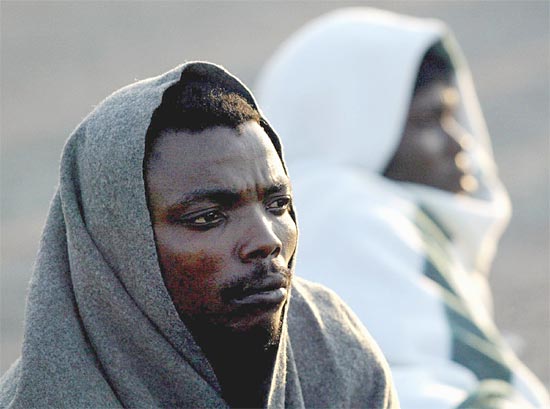Martyrs of migration
More dead bodies, already 250, cover the sea bed of the Mare Nostrum. But another death, promptly forgotten, added on to the list of “migration martyrs”, which stirs our conscience even more: the young asylum-seeker from Mali who committed suicide from the raised walkway of Milan’s train station. All these deaths, at sea and at train stations, are asking us not to weaken but rather to step up actions for the protection of the life and dignity of persons forced to emigrate.

While the political controversy on subsidiary aids of ships from the ten NGOs operating in the Mediterranean flares up, new deaths, already as many as 250, cover the sea bed of the Mare Nostrum. Once again the weakest brackets, women and children in search of a better future, are among the most numerous victims, as many as 1300 deaths in the Mediterranean sea in the first months of the year. But another death, promptly forgotten, added on to the list of “migration martyrs”, which stirs our conscience even more. He was a young asylum-seeker from Mali, who committed suicide from the raised walkway of Milan’s train station, dedicated to the Mother of migrants Saint Francesca Cabrini. The thirty-year-old immigrant from Mali had been waiting for an answer to his request for international protection for the past year and a half.
All of these dead persons at sea and at train stations require us not to weaken but rather to strengthen a set of actions for the protection of the life and dignity of people forced to migrate. These deaths urge us to extend control and rescue operations in the Mediterranean, understood as a primary, continuing action until the Mare Nostrum remains the only exit route available to migrant persons.
In the light of these high death-tolls it is necessary to undertake a determined, urgent commitment for and with Libya, for and with east African and sub-Saharan countries, to ensure security in the migrants’ home Countries and in the journeys from these Countries, now abandoned in the hands of traffickers in human beings and ruthless multinationals. It is a question of extending the experience of humanitarian corridors and channels which, as shown in our ongoing actions, are viable options, entailing the joint commitment of institutions, civil society and Churches. These deaths demand increased security for migrants entering Italy and the rest of Europe, so they may stop being victims of further humiliations and deprivation in the coming months and years.
These deaths demand peace,
in the Middle East, in Africa and in 35 world Countries from which 8 million people have fled last year to escape death caused by bombs or by weapons increasingly sold by European Countries. These deaths demand and urge our Italian and European democracies not to be overcome and disrupted by closure, egoism, populism and nationalism. Pope Francis reminded Heads of Government and State of EU Countries on the occasion of the 60th anniversary of the Treaties of Rome, celebrated past March 24: “Today the European Union needs to recover the sense of being primarily a “community” of persons and peoples… Europe finds new hope when she refuses to yield to fear or close herself off in false forms of security. Quite the contrary, her history has been greatly determined by encounters with other peoples and cultures; hers “is, and always has been, a dynamic and multicultural identity… It is not enough to handle the grave crisis of immigration of recent years as if it were a mere numerical or economic problem, or a question of security.” Every human life has the same value, especially in a democracy based on freedom, equality, and fraternity.
Forgetting these principles means falling back into barbarism.
(*) Archbishop of Ferrara-Comacchio and director General of the Migrantes Foundation